英语介绍 人身体部位 及相关习语
【英语】有关人体身体部位的英文谚语习语
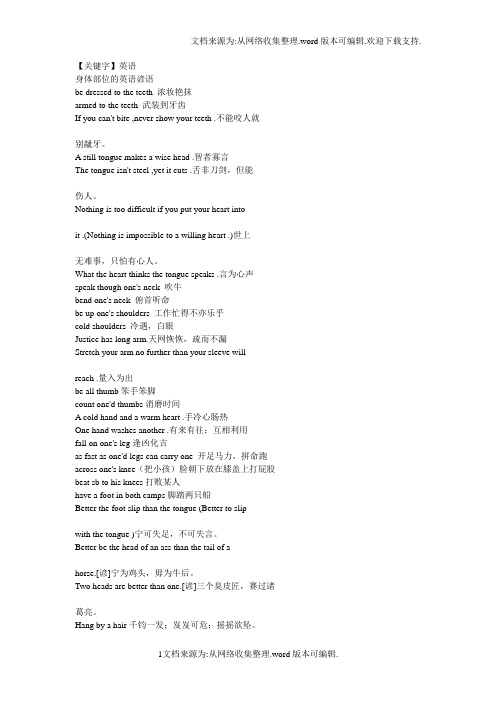
【关键字】英语身体部位的英语谚语be dressed to the teeth 浓妆艳抹armed to the teeth 武装到牙齿If you can't bite ,never show your teeth .不能咬人就别龇牙。
A still tongue makes a wise head .智者寡言The tongue isn't steel ,yet it cuts .舌非刀剑,但能伤人。
Nothing is too difficult if you put your heart intoit .(Nothing is impossible to a willing heart .)世上无难事,只怕有心人。
What the heart thinks the tongue speaks .言为心声speak though one's neck 吹牛bend one's neck 俯首听命be up one's shoulders 工作忙得不亦乐乎cold shoulders 冷遇,白眼Justice has long arm.天网恢恢,疏而不漏Stretch your arm no further than your sleeve willreach .量入为出be all thumb笨手笨脚count one'd thumbs消磨时间A cold hand and a warm heart .手冷心肠热One hand washes another .有来有往;互相利用fall on one's leg逢凶化吉as fast as one'd legs can carry one 开足马力,拼命跑across one's knee(把小孩)脸朝下放在膝盖上打屁股beat sb to his knees打败某人have a foot in both camps脚踏两只船Better the foot slip than the tongue (Better to slipwith the tongue )宁可失足,不可失言。
与身体部位有关的英语习语

与身体部位有关的英语习语1. HeadThe head is thought to be the most important part of the human body. So a leader is often compared to a head (首脑). Thus we have Head of State or the head of a delegation.The head is where the brain is located. It is naturally associated with ideas and intelligence. Very often, we need other people's ideas and opinions when we want to do something well. The is because two heads are better than one (三个臭皮匠顶个诸葛亮).2. EyeThe eyes are extremely precious to us. That is why we say" Mind your eye (当心)! when we reminding someone to be careful.Not only human beings and animals have eyes, many things also have" eyes"- the eyes ofa ship, the eye of a needle, the eye of a typhoon, and so on.3. EarThe ear is the organ of hearing. A piece of light music is easy on the ear. (悦耳动听). We are usually all ears (专心聆听) for bit news.When they think somebody is overhearing, English people use either of the two proverbs: Walls have ears (隔墙有耳) and Pitchers have ears (壶罐有耳). They also think that little pitchers have big ears(小孩子耳朵尖). Nice boys and girls respect other people. They will not secretly listen to others' private conversations.4. NoseThe English phrase "face to face (面对面)" and its Chinese counterpart(对应)are exactly the same. But English people, to express the same idea, can say nose to nose instead. There is no such substitute in Chinese.The word nose appears in many idioms. Here are two which are quite similar to their Chinese equivalents: lead somebody by the nose (牵着某人的鼻子走) and turn up one's nose at somebody or something (对某人或某物嗤之一鼻).English people can say as plain as the nose in one's face (一清二楚) to mean "very obvious". May be to them, the nose is the most conspicuous part of the face.5. LipWe have two lips: the upper lip and the lower lip. If one's two lips are closed, one cannot speak. So it goes without saying that "don't open your lips (不要开口)" means " don't speak".His lips are sealed. Are his lips really stuck together by wax or glue? No, his lips are sealed when asked about something that he must keep secret. Sometimes a top secret is betrayed because it has escaped someone's lips (脱口而出). Then the incident may become a piece of news that is on everybody's lips (众口相传).6. TongueWe all know we cannot speak without the tongue. So the tongue is closely related to speech. To hold one's tongue (保持沉默) means "to keep silent". A person who has too much tongue (太多嘴) is disliked by all, for he is too talkative. Mother tongue is not the tongue of a mother: it is a person's native language."Don't you have a moth below your nose (你鼻子底下不是有张嘴吗)?" The Chinese sayso to blame a person who did not say what he should have said. But this not the right way to express the idea in English. English people would say, "You have a tongue in your head, haven't you?"7. FaceFace has to do with the idea of respect and dignity both in Chinese and English. You lose your face (丢面子) if you fail again and again, but a decisive victory will save your face (挽回面子) after all your failures.When you feel unhappy, you pull a long face (拉长脸). The idea is conveyed in Chinese in the same way. But "about face (向后转)" does not refer to the face. It is a military order to turn round and face in the opposite direction. It is the exact equivalent of " about turn".8. ShoulderThe shoulders can bear heavy things. Your father has a great responsibility for the family on his shoulder. When faced with difficulty, the family should stand shoulder to shoulder (肩并肩) to overcome it. You should not turn a cold shoulder (不理睬) to your family members. Nor should you give your friends the cold shoulder (冷落朋友). Both expressions mean treating others coldly.9. BackA good host is hospitable to his guests. But, if guest is tiresome, the host is glad to see his back (他离开).If your friend has done something really well, you may give him a pat on the back (轻轻拍背部) to show your appreciation.If you turn your back on somebody (不理睬他人), you mean you do not like making friends with that person.10. HeartThe heart is an extremely important organ inside the chest. It usually stands for something important or the centre of something, for example, the heart of the matter (问题的核心) or the heart of mystery.Many other expressions make use of the word heart. A lover can be called a sweet heart (情人). The Purple Heart (紫心徽章) is a medal given as an honor to American soldiers wounded in battle.If your friend is in trouble, you may encourage him by saying "Don't lose heart (不要灰心)."11. StomachThe stomach is naturally related to one's appetite. If you dislike heavy food, you have no stomach for it (反胃). The word is also related to one's interests or likings. If you find something boring or vulgar, you have no stomach for it, either. Bad food turns your stomach. Similarly, your stomach turns at a bad joke.Stomach can also be a verb. Look at this example: "How could you stomach (忍受) such rude words?" Apparently, stomach here can be replaced by "tolerate".12. ArmEvery person has two arms: the right arm and the left arm. The right arm is usually stronger, so we call a good helper the right arm (得力助手).We all know an arm is not very long. But when you keep someone at arm's length (保持距离), the distance is long enough. For that means you don not like that person and you try your best to avoid him or her. We should indeed keep the bad friends at arm's length.13. HandQuite a number of phrases formed form the word hand are very similar to their Chinese counterparts. Here are some obvious examples: a fresh hand (新手), short of hands (人手短缺), hand in hand (手拉手) and wash one's hands of something (洗手不干了). But do not always take this for granted. Study these examples and you will understand.He lives from hand to mouth (He has just enough money to live on). We gave them a big hand (We gave them lots of applause).14. FingerHow many fingers does each of your hands have? Now let's name them in English from the smallest: the little finger, the ring finger, the middle finger, the index finger and thumb.Each finger has its own part to play. If your fingers are all thumbs (笨拙), that is too bad. That means you are very clumsy.15. ThumbChinese people turn up their thumbs to express appreciation. English people do so to express not only appreciation but also approval. Chinese people never turn their thumbs down to mean anything. But English people do. They do so to show depreciation disapproval. Thus in English you can say, "We turn thumbs up (赞成) to Jack's suggestion but they turn thumbs down (不赞成) to it."Similarly, you can warmly praise someone by saying "Thumbs up (真棒)!" and show your dissatisfaction by saying "Thumbs down (差劲)!"16. SkinMost people will only think of the hair on our head when the word hair is mentioned. In fact, some animals and plants also have hair.A horrible scene may make a person's hair stand on end (毛骨悚然). But a courageous person will not turn a hair (不畏惧) even though he is in face of danger.Sometimes, a friend of yours may be so angry that he may act foolishly. Then you had better give him this advice: "Keep your hair on (别发脾气)".Selected from the book The Human Body by Huang Juanhua。
最新身体部位英语习语50句
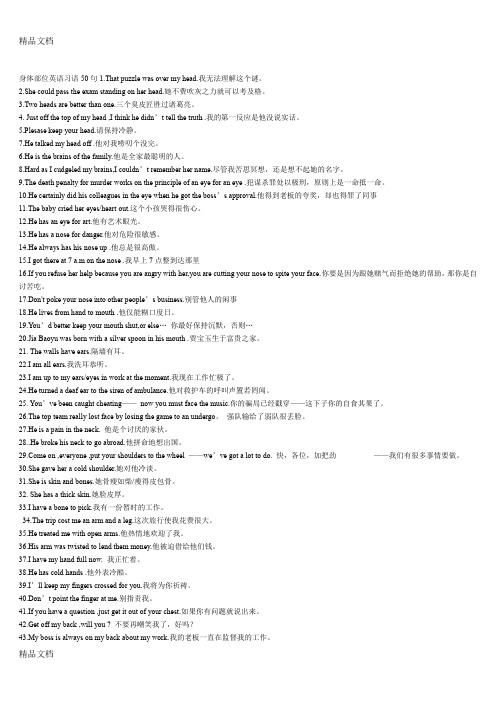
身体部位英语习语50句1.That puzzle was over my head.我无法理解这个谜。
2.She could pass the exam standing on her head.她不费吹灰之力就可以考及格。
3.Two heads are better than one.三个臭皮匠胜过诸葛亮。
4. Just off the top of my head ,I think he didn’t tell the truth .我的第一反应是他没说实话。
5.Plesase keep your head.请保持冷静。
7.He talked my head off .他对我唠叨个没完。
6.He is the brains of the family.他是全家最聪明的人。
8.Hard as I cudgeled my brains,I couldn’t remember her name.尽管我苦思冥想,还是想不起她的名字。
9.The death penalty for murder works on the principle of an eye for an eye .犯谋杀罪处以极刑,原则上是一命抵一命。
10.He certainly did his colleagues in the eye when he got the boss’s approval.他得到老板的夸奖,却也得罪了同事11.The baby cried her eyes/heart out.这个小孩哭得很伤心。
12.He has an eye for art.他有艺术眼光。
13.He has a nose for danger.他对危险很敏感。
14.He always has his nose up .他总是很高傲。
15.I got there at 7 a.m on the nose .我早上7点整到达那里16.If you refuse her help because you are angry with her,you are cutting your nose to spite your face.你要是因为跟她赌气而拒绝她的帮助,那你是自讨苦吃。
身体各部位介绍英语作文

身体各部位介绍英语作文Title: Introduction to Various Parts of the Human Body。
The human body is a complex and fascinating organism composed of various interconnected parts, each with its unique structure and function. In this essay, we will delve into the intricacies of different body parts, exploringtheir roles and significance in maintaining overall health and functionality.1. The Brain: Often referred to as the command centerof the body, the brain controls all voluntary andinvoluntary actions. It processes sensory information, enables thinking, learning, and emotions, and regulatesvital functions such as heartbeat and breathing.2. The Heart: This muscular organ is responsible for pumping oxygen-rich blood throughout the body via a network of blood vessels. It ensures that all cells receive the nutrients and oxygen they need to function properly.3. The Lungs: Vital for the respiratory system, the lungs facilitate the exchange of oxygen and carbon dioxide between the air we breathe and the bloodstream. Through inhalation and exhalation, they help maintain the body's acid-base balance and support cellular metabolism.4. The Liver: Acting as the body's detoxifier, theliver filters toxins from the blood, metabolizes nutrients, and produces bile, which aids in digestion. It also stores essential vitamins and minerals and plays a crucial role in regulating blood sugar levels.5. The Kidneys: These bean-shaped organs filter waste products and excess fluids from the blood to form urine, which is excreted from the body. They also help maintain electrolyte balance, regulate blood pressure, and stimulate the production of red blood cells.6. The Skin: The body's largest organ, the skin serves as a protective barrier against pathogens, UV radiation, and physical injury. It regulates body temperature,prevents dehydration, and houses sensory receptors for touch, temperature, and pain.7. The Muscles: Comprising over 600 muscles, the muscular system enables movement, supports posture, and generates heat to maintain body temperature. Skeletal muscles are under voluntary control, while smooth and cardiac muscles function involuntarily.8. The Bones: Providing structural support and protection for internal organs, bones form the framework of the body. They also produce red and white blood cells, store minerals like calcium and phosphorus, and facilitate movement by anchoring muscles.9. The Digestive System: Consisting of organs such as the stomach, intestines, liver, and pancreas, this system processes food, extracts nutrients, and eliminates waste. It involves mechanical and chemical digestion, absorption of nutrients, and the production of digestive enzymes and hormones.10. The Endocrine System: Comprising glands such as the pituitary, thyroid, and adrenal glands, this system regulates various bodily functions through the secretion of hormones. These chemical messengers control metabolism, growth, reproduction, and response to stress.11. The Immune System: A complex network of cells, tissues, and organs, the immune system defends the body against pathogens, foreign invaders, and abnormal cells. It includes white blood cells, antibodies, and lymphoid organs like the thymus and spleen.12. The Nervous System: Along with the brain and spinal cord, this system coordinates the body's responses to internal and external stimuli. It transmits electrical signals through neurons, allowing for sensation, movement, and communication between different body parts.In conclusion, the human body is a marvel of biological engineering, with each part playing a crucial role in maintaining overall health and functionality. Understandingthe structure and function of these body parts is essential for promoting well-being and preventing disease.。
最新有关身体部位的英语习语
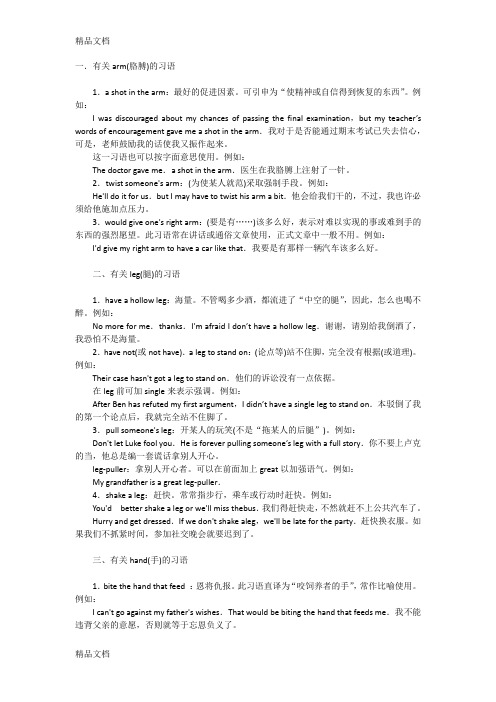
一.有关arm(胳膊)的习语1.a shot in the arm:最好的促进因素。
可引申为“使精神或自信得到恢复的东西”。
例如:I was discouraged about my chances of passing the final examination,but my teacher’s words of encouragement gave me a shot in the arm.我对于是否能通过期末考试已失去信心,可是,老师鼓励我的话使我又振作起来。
这一习语也可以按字面意思使用。
例如:The doctor gave me.a shot in the arm.医生在我胳膊上注射了一针。
2.twist someone's arm:(为使某人就范)采取强制手段。
例如:He'll do it for us.but I may have to twist his arm a bit.他会给我们干的,不过,我也许必须给他施加点压力。
3.would give one's right arm:(要是有……)该多么好,表示对难以实现的事或难到手的东西的强烈愿望。
此习语常在讲话或通俗文章使用,正式文章中一般不用。
例如:I'd give my right arm to have a car like that.我要是有那样一辆汽车该多么好。
二、有关leg(腿)的习语1.have a hollow leg:海量。
不管喝多少酒,都流进了“中空的腿”,因此,怎么也喝不醉。
例如:No more for me.thanks.I'm afraid I don’t have a hollow leg.谢谢,请别给我倒酒了,我恐怕不是海量。
2.have not(或not have).a leg to stand on:(论点等)站不住脚,完全没有根据(或道理)。
例如:Their case hasn't got a leg to stand on.他们的诉讼没有一点依据。
关于人体部位的英语习语
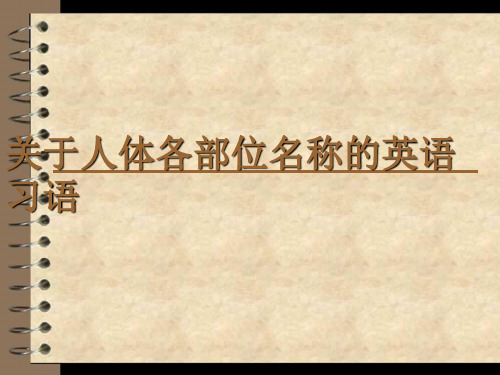
5、内涵丰富,不易理解 To turn the other cheek to sb 对某人宽容大 度 To cool one’s heels 等待休息 6、借助人体机能,激发自然联想 Head and brain 头脑,常与思考联系在一起 Nose 鼻子状的东西,与观察干预侦查联系 在一起
Eye 眼与看、注视、或看到的事物联 系 Ear 耳朵 与听联系 Mouth lips teeth tongue throat gums 发 音器官 与说联系 Heart 心常与认得整体性格,特别是 直觉、情感、精神、勇气、宽厚 或热情联系
4、具有鲜明的名族特色和地方色彩 英国用keep one’s head above water 不背债, 免遭灭顶 To be up to (one’s) ear in debt 深陷债务 To have one’s head screwed on the right way 有头脑,机智的(英国是工业国家, 把人体当成机器。)
有关eye的英语习语 Be up to your eyes in sth 忙于;深陷于; An eye for an eye 以牙还牙 For sb’s eye only 只供某人读或看
Have an eye for sth 对……有鉴赏力 Have an eye on sth 做另一件事得同时(悄悄)注意 Have eyes in your back of your head 脑后长眼;眼光敏锐
othercheeksb对某人宽容大coolonesheels等待休息6借助人体机能激发自然联想headbrain头脑常与思考联系在一起nose鼻子状的东西与观察干预侦查联系在一起eye眼与看注视或看到的事物联ear耳朵与听联系mouthlipsteethtonguethroatgums音器官与说联系heart心常与认得整体性格特别是直觉情感精神勇气宽厚或热情联系hand手使人联想到雇员有技术和有力量的人finger手指头与行事指示捞好处相联stomach胃胃口愿望意向相联系blood血与生命活力勇气相联系bone骨头与本质骨子相联系flesh肌肉与力量相联系nerves神经与感情情绪相联系gall胆汁厚颜无耻的guts内脏与勇气耐力忍耐相联系legfootheel与行走立足立场理据相联系有关head的英语习惯用语bangknockyourtheirheadstogether强行制止人们争吵并使之回复理智bangingyourheadagainstbrickwall用头撞墙
有关身体部位的英语习语
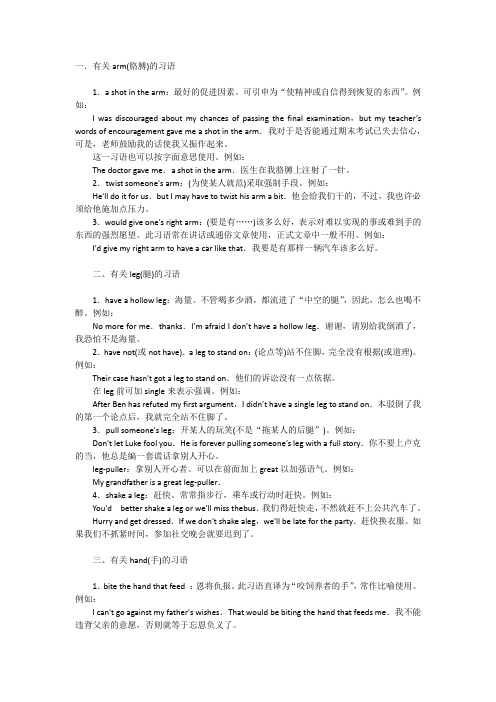
一.有关arm(胳膊)的习语1.a shot in the arm:最好的促进因素。
可引申为“使精神或自信得到恢复的东西”。
例如:I was discouraged about my chances of passing the final examination,but my teacher’s words of encouragement gave me a shot in the arm.我对于是否能通过期末考试已失去信心,可是,老师鼓励我的话使我又振作起来。
这一习语也可以按字面意思使用。
例如:The doctor gave me.a shot in the arm.医生在我胳膊上注射了一针。
2.twist someone's arm:(为使某人就范)采取强制手段。
例如:He'll do it for us.but I may have to twist his arm a bit.他会给我们干的,不过,我也许必须给他施加点压力。
3.would give one's right arm:(要是有……)该多么好,表示对难以实现的事或难到手的东西的强烈愿望。
此习语常在讲话或通俗文章使用,正式文章中一般不用。
例如:I'd give my right arm to have a car like that.我要是有那样一辆汽车该多么好。
二、有关leg(腿)的习语1.have a hollow leg:海量。
不管喝多少酒,都流进了“中空的腿”,因此,怎么也喝不醉。
例如:No more for me.thanks.I'm afraid I don’t have a hollow leg.谢谢,请别给我倒酒了,我恐怕不是海量。
2.have not(或not have).a leg to stand on:(论点等)站不住脚,完全没有根据(或道理)。
例如:Their case hasn't got a leg to stand on.他们的诉讼没有一点依据。
英语习语-身体部位类
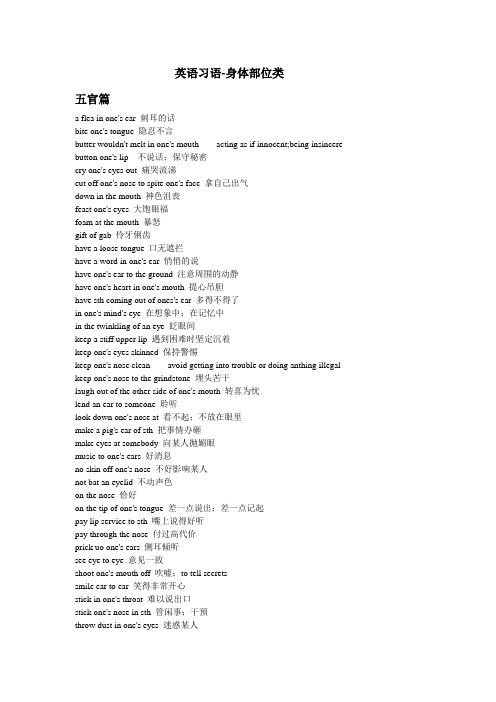
英语习语-身体部位类五官篇a flea in one's ear 刺耳的话bite one's tongue 隐忍不言butter wouldn't melt in one's mouth acting as if innocent;being insincere button one's lip 不说话;保守秘密cry one's eyes out 痛哭流涕cut off one's nose to spite one's face 拿自己出气down in the mouth 神色沮丧feast one's eyes 大饱眼福foam at the mouth 暴怒gift of gab 伶牙俐齿have a loose tongue 口无遮拦have a word in one's ear 悄悄的说have one's ear to the ground 注意周围的动静have one's heart in one's mouth 提心吊胆have sth coming out of ones's ear 多得不得了in one's mind's eye 在想象中;在记忆中in the twinkling of an eye 眨眼间keep a stiff upper lip 遇到困难时坚定沉着keep one's eyes skinned 保持警惕keep one's nose clean avoid getting into trouble or doing anthing illegal keep one's nose to the grindstone 埋头苦干laugh out of the other side of one's mouth 转喜为忧lend an ear to someone 聆听look down one's nose at 看不起;不放在眼里make a pig's ear of sth 把事情办砸make eyes at somebody 向某人抛媚眼music to one's ears 好消息no skin off one's nose 不好影响某人not bat an eyelid 不动声色on the nose 恰好on the tip of one's tongue 差一点说出;差一点记起pay lip service to sth 嘴上说得好听pay through the nose 付过高代价prick uo one's ears 侧耳倾听see eye to eye 意见一致shoot one's mouth off 吹嘘;to tell secretssmile ear to ear 笑得非常开心stick in one's throat 难以说出口stick one's nose in sth 管闲事;干预throw dust in one's eyes 迷惑某人tongue in cheek 无诚意地;粉刺地turn a blind eye to sth 视而不见turn a deaf ear to sth 充耳不闻up to one's ears 深陷于wet behind the ears 乳臭未干win by a nose 险胜with a jaundiced eye 有偏见的with one's nose in the air 目中无人地四肢篇be rushed off one's feet 非常忙bite the hand that feeds one 恩将仇报bring someone to heel 使某人服从burn one's fingers 管闲事或做投机买卖吃亏chance one's arm 冒险一试cool one's heels 久候cost an arm and a leg 价格极其昂贵down at heel 处境穷苦elbow grease 苦干体力活fall head over heels in love with someone 疯狂迷上某人fall upon one's feet 化险为夷feet of clay 大人物的致命弱点foot the bill 买单get one's feet wet 初次做某事;开始做某事get the lead out (of one's feet)动作迅速give someone a hand 帮助a big hand 鼓掌give someone a leg up 帮某人一把grease one's palm 贿赂某人hand in glove 密切合作;相互勾结have cold feet 胆怯have one's hands full 忙得不可开交have the upper hand 处于有利位置head and shoulders above 远远超过hit the nai on the head 正中要害hold ... at arm's length 与...保持距离keep on one's toes keep one attentive, active, busy, or alert know ... like the back of one's hand 了如指掌live from hand to mouth 仅能糊口not have a leg to stand on 站不住脚on one's last legs 垂死;疲惫不堪pull one's leg 开玩笑put one's best foot forward 快点走;全力以赴;留下好印象put one's foot in one's mouth 讲话不得体put one's shoulder to the wheel 全力以赴rap someone over the knuckles 批评某人rub shoulders with someone 与有钱人、名人接触、来往shot in the arm 刺激物show one's hand 摊牌show the cloven foot 露马脚step on one's toes 伤害某人straight from the shoulder 直截了当地说take to one's heels 跑开throw in one's hand 放弃thumb a lift 搭便车thumb one's nose 蔑视twist someone around one's little finger 控制某人twist one's arm 强迫别人做不愿做的事under one's thumb 受某人支配work one's fingers to the bone 拼命工作其他a pat on the back 表扬、赞许的话或动作a slap in the face 羞辱;让人没面子的事情all skin and bones 皮包骨的bad blood 不好的情感be glad to see the back of someone 希望摆脱某人bone up on.. 刻苦用功读书by a hair's breadth 险些...cheek by jowl with 紧紧靠着地come to a head 到关键时刻cudgel one's brains 绞尽脑汁eat one's heart out 悲痛欲绝;嫉妒feel sth in one's bones 有强烈的直觉fly in the face of 公然违抗get it in the neck 受到惩罚get one by the short hairs 使某人就范get one's own back on someone 报复get sth off one's chest 一吐为快grit one's teeth 咬牙坚持have a frog in one's throat 声音嘶哑have a hunch 有预感have egg on one's face 丢脸have one's back to the wall 处境困难have one's head in the clouds 想入非非jump down one's throat 突然动怒;严厉斥责jump out of one's skin 大吃一惊keep a straight face 摆着脸keep body and soul together 勉强糊口keep one's head above water 避免陷入困境long in tooth 上了年纪的make a clean breast of sth 忏悔;招认make no bones about sth 直言不讳make old bones 长寿make one's blood boil 使某人大发雷霆make one's blood run cold 让人胆战心惊make one's hair stand on end 让人毛骨悚然neck or nothing 孤注一掷地not turn a hair 毫不惊慌off the top of one's head 毫无准备地pain in the neck 令人讨厌的事或人save one's skin 使安然无恙set one's teeth one edge 使某人感动不舒服split hairs 钻牛角尖stab one in the back 暗算;背叛stare someone in the face 就在眼前take one's breath away 令人惊叹take the bit between one's teeth 不受控制;下定决心做某事tooth and nail 竭尽全力地touch one's forelock 毕恭毕敬turn one's back on someone 拒绝帮助;不理会turn tail 掉头逃跑until one is blue in the face 极尽努力vent one's spleen 发泄怒气。
介绍人身体部位的英语作文

介绍人身体部位的英语作文Introduction:The human body is a complex and fascinating structure, and learning the English terms for its various parts can be both educational and useful. In this essay, we will delve into the vocabulary related to different body parts, from the head to the toes, and provide a comprehensive overview of the terminology.Paragraph 1: The Head and FaceBegin by introducing the uppermost part of the body, the head, which houses the brain and is the control center for the body. Discuss the face, mentioning key features such as the eyes, ears, nose, and mouth. Use descriptive language to explainthe function of each feature, for example, "The eyes, two sparkling windows to the soul, allow us to perceive the world around us."Paragraph 2: The Neck and TorsoTransition to the neck, which supports the head and connectsit to the torso. Describe the neck's role in movement and its importance to the body's structure. Move on to the torso, which includes the chest, abdomen, and back. Highlight the significance of the chest for respiration and the abdomen for digestion and reproduction.Paragraph 3: The Arms and HandsNext, explore the upper limbs, starting with the arms andtheir function in movement and manipulation. Discuss the bones, muscles, and joints that work together to provide a wide range of motion. Then, focus on the hands, detailing the fingers and their dexterity, which are crucial for performing intricate tasks.Paragraph 4: The Legs and FeetConclude with the lower limbs, the legs, which bear thebody's weight and enable locomotion. Describe the leg's structure, from the thigh to the calf, and the role of the knee as a pivotal joint. Finally, introduce the feet, emphasizing their importance for balance and support, and mention the toes, which provide additional grip and sensation.Conclusion:In summary, the human body is an intricate system of interconnected parts, each with a specific function. Understanding the English terms for these parts not only enhances our knowledge of anatomy but also helps in everyday communication. Whether it's describing an injury, discussing health, or simply talking about physical activities, knowing the correct body part names is essential.Vocabulary List:- Head- Brain- Face- Eyes- Ears- Nose- Mouth- Neck- Torso- Chest- Abdomen- Back- Arms- Hands- Fingers- Legs- Feet- ToesRemember, this essay is a starting point for learning about the human body in English. As you expand your vocabulary,you'll be able to discuss more complex concepts and engage in deeper conversations about health and the human form.。
有关人体身体部位的英文谚语习语
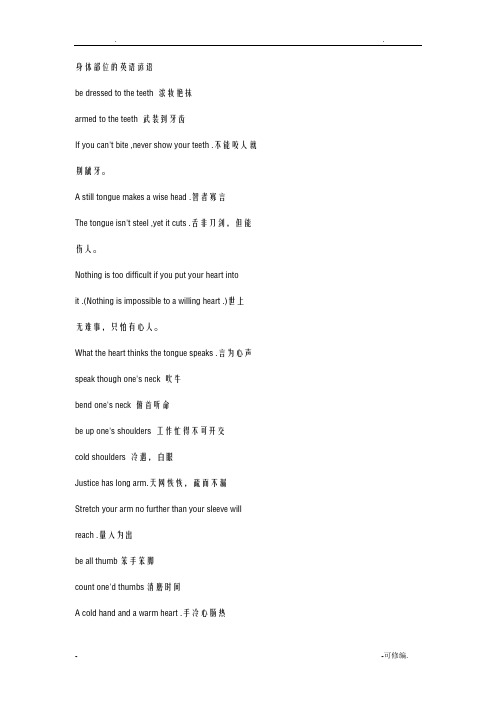
身体部位的英语谚语be dressed to the teeth 浓妆艳抹armed to the teeth 武装到牙齿If you can't bite ,never show your teeth .不能咬人就别龇牙。
A still tongue makes a wise head .智者寡言The tongue isn't steel ,yet it cuts .舌非刀剑,但能伤人。
Nothing is too difficult if you put your heart intoit .(Nothing is impossible to a willing heart .)世上无难事,只怕有心人。
What the heart thinks the tongue speaks .言为心声speak though one's neck 吹牛bend one's neck 俯首听命be up one's shoulders 工作忙得不可开交cold shoulders 冷遇,白眼Justice has long arm.天网恢恢,疏而不漏Stretch your arm no further than your sleeve will reach .量入为出be all thumb笨手笨脚count one'd thumbs消磨时间A cold hand and a warm heart .手冷心肠热One hand washes another .有来有往;互相利用fall on one's leg逢凶化吉as fast as one'd legs can carry one 开足马力,拼命跑across one's knee(把小孩)脸朝下放在膝盖上打屁股beat sb to his knees打败某人have a foot in both camps脚踏两只船Better the foot slip than the tongue (Better to slipwith the tongue )宁可失足,不可失言。
有关人体身体部位的英文谚语习语
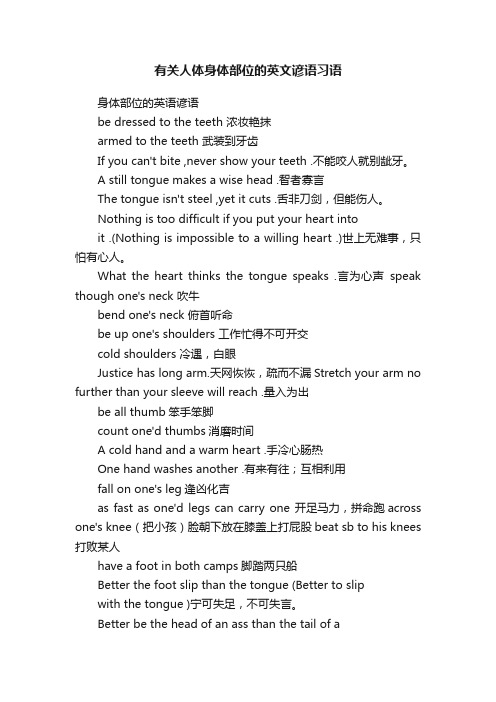
有关人体身体部位的英文谚语习语身体部位的英语谚语be dressed to the teeth 浓妆艳抹armed to the teeth 武装到牙齿If you can't bite ,never show your teeth .不能咬人就别龇牙。
A still tongue makes a wise head .智者寡言The tongue isn't steel ,yet it cuts .舌非刀剑,但能伤人。
Nothing is too difficult if you put your heart intoit .(Nothing is impossible to a willing heart .)世上无难事,只怕有心人。
What the heart thinks the tongue speaks .言为心声speak though one's neck 吹牛bend one's neck 俯首听命be up one's shoulders 工作忙得不可开交cold shoulders 冷遇,白眼Justice has long arm.天网恢恢,疏而不漏Stretch your arm no further than your sleeve will reach .量入为出be all thumb笨手笨脚count one'd thumbs消磨时间A cold hand and a warm heart .手冷心肠热One hand washes another .有来有往;互相利用fall on one's leg逢凶化吉as fast as one'd legs can carry one 开足马力,拼命跑across one's knee(把小孩)脸朝下放在膝盖上打屁股beat sb to his knees 打败某人have a foot in both camps脚踏两只船Better the foot slip than the tongue (Better to slipwith the tongue )宁可失足,不可失言。
与人体部位相关的英语习语5
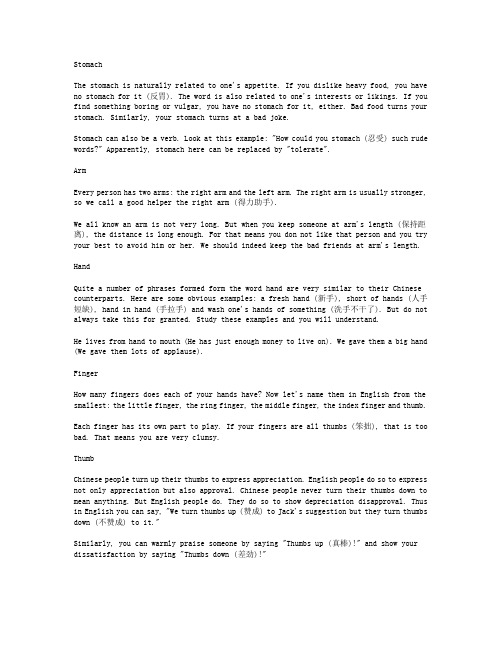
StomachThe stomach is naturally related to one's appetite. If you dislike heavy food, you have no stomach for it (反胃). The word is also related to one's interests or likings. If you find something boring or vulgar, you have no stomach for it, either. Bad food turns your stomach. Similarly, your stomach turns at a bad joke.Stomach can also be a verb. Look at this example: "How could you stomach (忍受) such rude words?" Apparently, stomach here can be replaced by "tolerate".ArmEvery person has two arms: the right arm and the left arm. The right arm is usually stronger, so we call a good helper the right arm (得力助手).We all know an arm is not very long. But when you keep someone at arm's length (保持距离), the distance is long enough. For that means you don not like that person and you try your best to avoid him or her. We should indeed keep the bad friends at arm's length.HandQuite a number of phrases formed form the word hand are very similar to their Chinese counterparts. Here are some obvious examples: a fresh hand (新手), short of hands (人手短缺), hand in hand (手拉手) and wash one's hands of something (洗手不干了). But do not always take this for granted. Study these examples and you will understand.He lives from hand to mouth (He has just enough money to live on). We gave them a big hand (We gave them lots of applause).FingerHow many fingers does each of your hands have? Now let's name them in English from the smallest: the little finger, the ring finger, the middle finger, the index finger and thumb.Each finger has its own part to play. If your fingers are all thumbs (笨拙), that is too bad. That means you are very clumsy.ThumbChinese people turn up their thumbs to express appreciation. English people do so to express not only appreciation but also approval. Chinese people never turn their thumbs down to mean anything. But English people do. They do so to show depreciation disapproval. Thus in English you can say, "We turn thumbs up (赞成) to Jack's suggestion but they turn thumbs down (不赞成) to it."Similarly, you can warmly praise someone by saying "Thumbs up (真棒)!" and show your dissatisfaction by saying "Thumbs down (差劲)!"。
有关人体身体部位的英文谚语习语
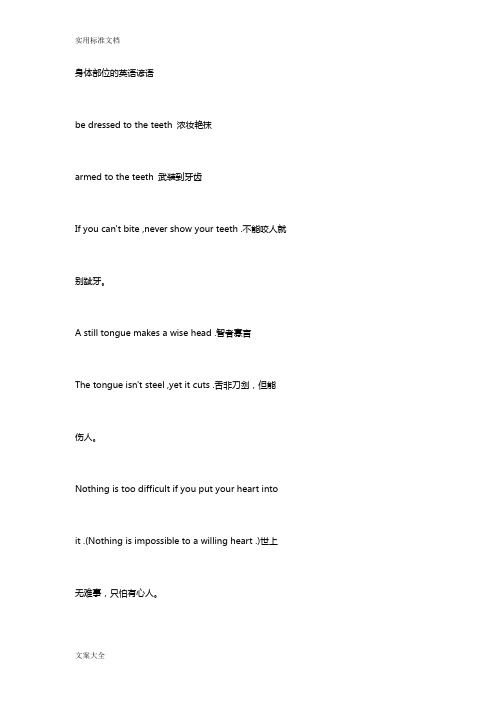
身体部位的英语谚语be dressed to the teeth 浓妆艳抹armed to the teeth 武装到牙齿If you can't bite ,never show your teeth .不能咬人就别龇牙。
A still tongue makes a wise head .智者寡言The tongue isn't steel ,yet it cuts .舌非刀剑,但能伤人。
Nothing is too difficult if you put your heart into it .(Nothing is impossible to a willing heart .)世上无难事,只怕有心人。
What the heart thinks the tongue speaks .言为心声speak though one's neck 吹牛bend one's neck 俯首听命be up one's shoulders 工作忙得不可开交cold shoulders 冷遇,白眼Justice has long arm.天网恢恢,疏而不漏Stretch your arm no further than your sleeve will reach .量入为出be all thumb笨手笨脚count one'd thumbs消磨时间A cold hand and a warm heart .手冷心肠热One hand washes another .有来有往;互相利用fall on one's leg逢凶化吉as fast as one'd legs can carry one 开足马力,拼命跑across one's knee(把小孩)脸朝下放在膝盖上打屁股beat sb to his knees打败某人have a foot in both camps脚踏两只船Better the foot slip than the tongue (Better to slip with the tongue )宁可失足,不可失言。
描写人物身材外貌五官的英语词汇和句子

人物的外貌特征一直是文学作品和日常交流中不可或缺的部分。
描述一个人的身材、五官和容貌需要丰富的词汇和句子。
从简到繁地探讨这个主题,我们可以从身体各部位开始逐步展开,包括头部、面部、眼睛、鼻子、嘴巴等,以便更全面地理解和描述一个人的外貌。
1. 头部头部是人体的重要部位,对于一个人的外貌来说也是至关重要的。
英语中用来描述头部的词汇有很多,比如"head"(头部)、"hair"(头发)、"forehead"(额头)、"chin"(下巴)等。
当我们要描述一个人的外貌时,可以使用这些词汇来展开描述,比如"Her head is small and round"(她的头部小而圆)、"He has a high forehead"(他的额头高高的)等。
2. 面部面部是人的外貌特征中最直观的部分,对于描述一个人的外貌来说至关重要。
在英语中,常用来描述面部外貌特征的词汇有"face"(脸)、"nose"(鼻子)、"mouth"(嘴巴)等。
我们可以用这些词汇来描述一个人的脸型、脸色、皮肤状态等,比如"Her face is oval-shaped"(她的脸型是椭圆形的)、"He has a red, rosy cheeks"(他的脸上红红的,很有红润的感觉)等。
3. 眼睛眼睛是人体最具表情和魅力的部位之一,对于描述一个人的外貌也是至关重要的。
在英语中,常用来描述眼睛的词汇有"eyes"(眼睛)、"eyebrows"(眉毛)、"eyelashes"(睫毛)等。
我们可以用这些词汇来描述一个人的眼睛的形状、颜色、眉毛的浓淡等,比如"Her eyes are big and bright"(她的眼睛又大又亮)、"He has thick, dark eyebrows"(他的眉毛又粗又黑)等。
英语介绍人身体部位与相关习语

英语介绍⼈⾝体部位与相关习语⼈体部位和英语习语1. HeadThe head is thought to be the most important part of the human body. So a leader is oftencompared to a head ( ⾸脑 ). Thus we have Head of State or the head of a delegation.The head is where the brain is located. It is naturally associated with ideas and intelligence.Very often, we need other people's ideas and opinions when we want to do something well.The is because two heads are better than one (三个臭⽪匠顶个诸葛亮).2. EyeThe eyes are extremely precious to us. That is why we say" Mind your eye (当⼼)! when we reminding someone to be careful. Not only human beings and animals have eyes, many things also have" eyes" the eyes of aship, the eye of a needle, the eye of a typhoon, and so on.3. EarThe ear is the organ of hearing. A piece of light music is easy on the ear. (悦⽿动听). We are usually all ears (专⼼聆听) for bit news.When they think somebody is overhearing, English people use either of the two proverbs:Walls have ears (隔墙有⽿) and Pitchers have ears (壶罐有⽿). They also think that little pitchers have big ears( ⼩孩⼦⽿朵尖 ). Nice boys and girls respect other people. They will notsecretly listen to others' private conversations.4. NoseThe English phrase "face to face ( ⾯对⾯ )" and its Chinese counterpart( 对应 ) are exactly the same. But English people, to express the same idea, can say nose to nose instead. There is no such substitute in Chinese.The word nose appears in many idioms. Here are two which are quite similar to their Chinese equivalents: lead somebody by the nose (牵着某⼈的⿐⼦⾛) and turn up one's nose at somebody or something (对某⼈或某物嗤之⼀⿐).English people can say as plain as the nose in one's face (⼀清⼆楚) to mean "very obvious". May be to them, the nose is the most conspicuous part of the face.5. LipWe have two lips: the upper lip and the lower lip. If one's two lips are closed, one cannotspeak. So it goes without saying that "don't open your lips (不要开⼝)" means "don't speak".His lips are sealed. Are his lips really stuck together by wax or glue? No, his lips are sealedwhen asked about something that he must keep secret. Sometimes a top secret is betrayedbecause it has escaped someone's lips (脱⼝⽽出). Then the incident may become a piece ofnews that is on everybody's lips (众⼝相传).6. TongueWe all know we cannot speak without the tongue. So the tongue is closely related to speech.To hold one's tongue ( 保持沉默 ) means "to keep silent". A person who has too much tongue(太多嘴 ) is disliked by all, for he is too talkative. Mother tongue is not the tongue of a mother: itis a person's native language."Don't you have a moth below your nose (你⿐⼦底下不是有张嘴吗)?" The Chinese say so to blame a person who did not say what he should have said. But this not the right way toexpress the idea in English. English people would say, "You have a tongue in your head,haven't you?"7. FaceFace has to do with the idea of respect and dignity both in Chinese and English. You loseyour face ( 丢⾯⼦ ) if you fail again and again, but a decisive victory will save your face (挽回⾯⼦) after all your failures.When you feel unhappy, you pull a long face (拉长脸). The idea is conveyed in Chinese in the same way. But "about face (向后转)" does not refer to the face. It is a military order to turnround and face in the opposite direction. It is the exact equivalent of " about turn".8. ShoulderThe shoulders can bear heavy things. Your father has a great responsibility for the family on) his shoulder. When faced with difficulty, the family should stand shoulder to shoulder (肩并肩to overcome it. You should not turn a cold shoulder (不理睬) to your family members. Norshould you give your friends the cold shoulder (冷落朋友). Both expressions mean treatingothers coldly.9. BackA good host is hospitable to his guests. But, if guest is tiresome, the host is glad to see hisback ( 他离开 ).If your friend has done something really well, you may give him a pat on the back (轻轻拍背部) to show your appreciation.If you turn your back on somebody ( 不理睬他⼈ ), you mean you do not like making friends withthat person.10. HeartThe heart is an extremely important organ inside the chest. It usually stands for somethingimportant or the centre of something, for example, the heart of the matter ( 问题的核⼼ ) or the heart of mystery.Many other expressions make use of the word heart. A lover can be called a sweet heart (情⼈). The Purple Heart ( 紫⼼徽章) is a medal given as an honor to American soldiers wounded in battle.If your friend is in trouble, you may encourage him by saying "Don't lose heart (不要灰⼼)." 11. StomachThe stomach is naturally related to one's appetite. If you dislike heavy food, you have nostomach for it ( 反胃 ). The word is also related to one's interests or likings. If you findsomething boring or vulgar, you have no stomach for it, either. Bad food turns your stomach.Similarly, your stomach turns at a bad joke.Stomach can also be a verb. Look at this example: "How could you stomach (忍受) such rude words?" Apparently, stomach here can be replaced by "tolerate".12. ArmEvery person has two arms: the right arm and the left arm. The right arm is usually stronger,so we call a good helper the right arm (得⼒助⼿).We all know an arm is not very long. But when you keep someone at arm's length (保持距离), the distance is long enough. For that means you don not like that person and you try yourbest to avoid him or her. We should indeed keep the bad friends at arm's length.13. HandQuite a number of phrases formed form the word hand are very similar to their Chinesecounterparts. Here are some obvious examples: a fresh hand (新⼿), short of hands (⼈⼿短缺), hand in hand (⼿拉⼿) and wash one's hands of something (洗⼿不⼲了). But do not always take this for granted. Study these examples and you will understand.He lives from hand to mouth (He has just enough money to live on). We gave them a big hand(We gave them lots of applause).14. FingerHow many fingers does each of your hands have? Now let's name them in English fromthe smallest: the little finger, the ring finger, the middle finger, the index finger and thumb.Each finger has its own part to play. If your fingers are all thumbs (笨拙), that is too bad. That means you are very clumsy. 15. ThumbChinese people turn up their thumbs to express appreciation. English people do so to expressnot only appreciation but also approval. Chinese people never turn their thumbs down tomean anything. But English people do. They do so to show depreciation disapproval. Thus inEnglish you can say, "We turn thumbs up ( 赞成 ) to Jack's suggestion but they turn thumbsdown ( 不赞成 ) to it."Similarly, you can warmly praise someone by saying "Thumbs up (真棒)!" and show your dissatisfaction by saying "Thumbs down (差劲)!"16. NailIf you see two of your classmates fighting tooth and nail (⼜抓⼜咬), you must stop them at once. Otherwise, at least one of them would be hurt.Nail also means a thin pointed piece of metal for hammering into something. But it is relatedto the body in this sentence: "Peter is as hard as nails ( 结实的象铁打的 )." We all hope that we are as strong and healthy as he is.Then if I say you have hit the nail on the head (中肯,⼀针见⾎), I don not mean that you have done something cruel. I mean that you have said exactly the right thing.17. LegThe word leg appears in many colloquial expressions. At a party, when you feel like dancing,you can say to a good friend of yours, "Let's shake a leg." Obviously, it means " Let's dance."When you want your fiend to hurry, you can also "shake a leg". In American English it means "hurry".The arms and legs are very important to us. Therefore when asked why you are not goingto buy something expensive, you may answer, "It costs an arm and a leg!" You mean that itis really expensive. If you pull one's leg, it means you make fun of someone.18. ToeTo convey the idea "from head to foot", English people san say from top to toe. But Chinese people don't.Some people turn their toes out (⼋字脚) when they walk. Some turn their toes in.When faced with danger, we must be alert and ready for action, that is to say, we must beon our toes ( 保持警惕 ).19. SkinHuman beings have skin. So have animals and plants. The skin can be think or thin. Athink-skinned person, or a person who has a thin skin, is easily upset or offended while athick-skinned person, or a person who has a think skin, is quite the contrary. Bothexpressions are sometimes derogatory ( 贬义 ). That is to say, sometimes the former refers to a person who is too sensitive; the latter a person who has little sense of shame.20. HairMost people will only think of the hair on our head when the word hair is mentioned. In fact, some animals and plants also have hair.A horrible scene may make a person's hair stand on end (⽑⾻悚然). But a courageous person will not turn a hair (不畏惧) even though he is in face of danger.Sometimes, a friend of yours may be so angry that he may act foolishly. Then you had better give him this advice: "Keep your hair on (别发脾⽓)".。
人体部位英语词汇集锦

人体部位英语词锦人体部位英语词汇集锦导语:人体即一个人的身体,主要组成部分有头、颈、躯干、双臂及双腿。
对于一般生物学或医学而言,人体除包括以上各部分,还包括呼吸、心血管、神经系统和其他内脏,而每部分皆由细胞构成。
下面小编为您收集整理了人体部位英语词汇,欢迎阅读!人体部位英语词汇(一)waist 腰hip 臀部buttock 屁股skull 颅骨,头盖骨collarbone 锁骨rib 肋骨backbone 脊骨,脊柱shoulder joint 肩关节shoulder blade 肩胛骨breastbone 胸骨elbow joint 肘关节pelvis 骨盆kneecap 膝盖骨head 头throat 喉咙,咽喉armpit hair 腋毛nipple 乳头chest 胸部pit 胸口navel 肚脐abdomen 腹部private parts 阴部thigh 大腿neck 脖子shoulder 肩back 背bone 骨skeleton 骨骼人体部位英语词汇(二)stomach 胃liver 肝脏gall bladder 胆囊pancreas 胰腺spleen 脾duodenum 12指肠small intestine 小肠large intestine 大肠blind gut 盲肠vermiform appendix 阑尾rectum 直肠anus 肛门bite 咬chew 咀嚼knead 揉捏swallow 咽下digest 消化absord 吸收discharge 排泄excrement 粪便spinal marrow 脊髓brain 脑respiration 呼吸windpipe 气管lung 肺heart 心脏diaphragm 隔膜exhale 呼出inhale 呼入internal organs 内脏gullet 食管kidney 肾脏bladder 膀胱penis 阴茎testicles 睾丸scroticles 阴囊urine 尿道ovary 卵巢womb 子宫vagina 阴道hair 头发forehead 额temple 太阳穴eyebrow 眉毛eye 眼睛ear 耳朵cheek 面颊nose 鼻子lip 嘴唇mouth 口。
有关人体身体部位的英文谚语习语
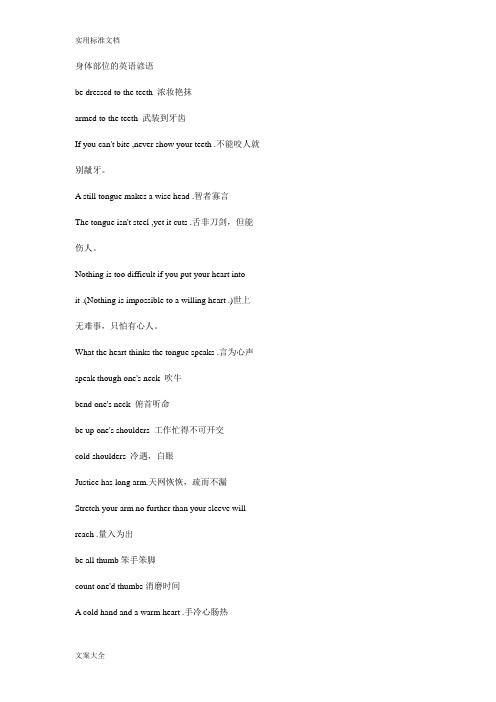
Be all ears洗耳恭听。
Hold one’s nose in the air.目中无人。
See no further than one’s nose.鼠目寸光。
A close mouth catches no flies.口紧不招祸。
子。
Ear耳朵
Be all ears洗耳恭听。
Nose鼻子
Hold one’s nose in the air.目中无人。
See no further than one’s nose.鼠目寸光。
Mouth嘴,口
A close mouth catches no flies.[谚语]口紧不招祸。
Keep your mouth shut and your eyes open.[谚语]多看少
If you cannot bite, never show your teeth.不能打仗,
切莫出兵
A fair face may hide a foul heart人不可貌相
Head头、头部
Better be the head of an ass than the tail of a
horse.[谚]宁为鸡头,毋为牛后。
(另外,人不可貌相还可以说You cannot judge a tree
by its bark)
A fool's heart dances on his lips.
愚人心坦荡,挂在嘴唇上.
Fair faces need no paint.
貌美毋须修饰。
手指
Gain got by a lie will burn one's fingers.
身体各部位介绍英语作文

身体各部位介绍英语作文Introduction:The human body is a complex and fascinating machine. It is made up of various parts that work together to help us carry out our daily activities. In this article, we will explore the different parts of the human body and their functions.Head:The head is the uppermost part of the body, and it contains the brain, which is the control center of the body. The brain controls all the body's functions, including movement, sensation, and thought. The head also containsthe eyes, ears, nose, and mouth. The eyes help us to see, the ears help us to hear, the nose helps us to smell, and the mouth helps us to eat and speak.Neck:The neck connects the head to the rest of the body. It contains the windpipe, which carries air to the lungs, and the esophagus, which carries food to the stomach. The neck also contains the thyroid gland, which produces hormones that regulate the body's metabolism.Shoulders:The shoulders are the joints that connect the arms to the body. They allow us to move our arms in all directions and perform various activities, such as lifting, throwing, and pushing.Arms:The arms are the upper limbs of the body, and they are used for various activities, such as reaching, grasping, and carrying. They contain muscles, bones, and joints that work together to help us perform these activities.Hands:The hands are the most versatile part of the body, and they are used for various activities, such as writing, typing, and playing musical instruments. They contain muscles, bones, and joints that work together to help us perform these activities. The hands also contain sensory receptors that help us to feel and touch things.Chest:The chest contains the heart and lungs, which are vital organs that help us to breathe and circulate blood throughout the body. The chest also contains the ribcage, which protects these organs from damage.Stomach:The stomach is a muscular organ that helps to digest food. It contains acid and enzymes that break down foodinto smaller particles, which can be absorbed by the body.Intestines:The intestines are long, tube-like organs that help to absorb nutrients from food. They are divided into two parts: the small intestine and the large intestine. The small intestine is where most of the nutrients are absorbed,while the large intestine is where waste products arestored before they are eliminated from the body.Legs:The legs are the lower limbs of the body, and they are used for various activities, such as walking, running, and jumping. They contain muscles, bones, and joints that work together to help us perform these activities.Feet:The feet are the lowest part of the body, and they are used for walking and standing. They contain bones, muscles, and joints that work together to help us maintain balance and stability.Conclusion:In conclusion, the human body is a complex and fascinating machine that is made up of various parts that work together to help us carry out our daily activities. Each part of the body has its own unique function, and all the parts work together to help us function as a whole. Understanding the different parts of the body and their functions can help us to take better care of ourselves and live healthier lives.。
英语习语:与身体部位有关的表达

【导语】做演讲或者和他⼈交流时,我们的肢体语⾔扮演着⼀个很重要的⾓⾊。
当然,眼神交流、⽤⼼倾听等等这些都是必须的。
那么,关于⾝体部位的英语习语,你知道多少呢?以下内容由整理发布,欢迎阅读参考!更多相关讯息请关注!下⾯给⼤家介绍⼀下与⾝体部位有关的⼀些英语习语吧。
An eye for an eye, and we all go blind.以⽛还⽛,两败俱伤。
在《⽼友记》第⼀季中出现过以⽛还⽛的另⼀种表达“tit for tat”。
Beauty is in the eye of the gazer.情⼈的眼⾥出西施。
Walls have ears.隔墙有⽿。
Go in one ear and out the other.左⽿进,右⽿出。
/ 当⽿边风。
A still tongue makes wise head.寡⾔为智。
Be all ears.洗⽿恭听。
Turn a deaf ear.充⽿不闻。
/ 置之不理。
充⽿不闻⽤来形容有意不听别⼈的意见。
Run off at the mouth./ shoot off one’s mouth.信⼝开河。
信⼝开河指说话没有根据;不可靠。
相当于talk at randomDown in/at the mouth垂头丧⽓垂头丧⽓在英语中相当于“depression”Big mouth.⼤嘴巴⼤嘴巴⼀般是指那些守不住秘密的⼈,不会保密,⽼说漏嘴。
(台湾有个嘻哈组合叫⼤嘴巴)Start from scratch./ start empty-handed⽩⼿起家⽩⼿起家原意是指空⼿起家,引申为条件极差的情况下创⽴事业。
Don’t cut off your nose to spite your face.不要害⼈害⼰。
See no further than one’s nose.⿏⽬⼨光。
⿏⽬⼨光⽐喻⽬光短浅,缺乏远见。
Lead someone by the nose牵着⿐⼦⾛牵着⿐⼦⾛常⽤来⽐喻受⼈控制,受⼈⽀配,盲⽬地听命于他⼈。
- 1、下载文档前请自行甄别文档内容的完整性,平台不提供额外的编辑、内容补充、找答案等附加服务。
- 2、"仅部分预览"的文档,不可在线预览部分如存在完整性等问题,可反馈申请退款(可完整预览的文档不适用该条件!)。
- 3、如文档侵犯您的权益,请联系客服反馈,我们会尽快为您处理(人工客服工作时间:9:00-18:30)。
人体部位和英语习语1. HeadThe head is thought to be the most important part of the human body. So a leader is often compared to a head (首脑). Thus we have Head of State or the head of a delegation.The head is where the brain is located. It is naturally associated with ideas and intelligence. Very often, we need other people's ideas and opinions when we want to do something well. The is because two heads are better than one (三个臭皮匠顶个诸葛亮).2. EyeThe eyes are extremely precious to us. That is why we say" Mind your eye (当心)! when we reminding someone to be careful.Not only human beings and animals have eyes, many things also have" eyes" the eyes of a ship, the eye of a needle, the eye of a typhoon, and so on.3. EarThe ear is the organ of hearing. A piece of light music is easy on the ear. (悦耳动听). We are usually all ears (专心聆听) for bit news.When they think somebody is overhearing, English people use either of the two proverbs: Walls have ears (隔墙有耳) and Pitchers have ears (壶罐有耳). They also think that little pitchers have big ears(小孩子耳朵尖). Nice boys and girls respect other people. They will not secretly listen to others' private conversations.4. NoseThe English phrase "face to face (面对面)" and its Chinese counterpart(对应) are exactly the same. But English people, to express the same idea, can say nose to nose instead. There is no such substitute in Chinese.The word nose appears in many idioms. Here are two which are quite similar to their Chinese equivalents: lead somebody by the nose (牵着某人的鼻子走) and turn up one's nose at somebody or something (对某人或某物嗤之一鼻).English people can say as plain as the nose in one's face (一清二楚) to mean "very obvious". May be to them, the nose is the most conspicuous part of the face.5. LipWe have two lips: the upper lip and the lower lip. If one's two lips are closed, one cannot speak. So it goes without saying that "don't open your lips (不要开口)" means "don't speak".His lips are sealed. Are his lips really stuck together by wax or glue? No, his lips are sealed when asked about something that he must keep secret. Sometimes a top secret is betrayed because it has escaped someone's lips (脱口而出). Then the incident may become a piece of news that is on everybody's lips (众口相传).6. TongueWe all know we cannot speak without the tongue. So the tongue is closely related to speech. To hold one's tongue (保持沉默) means "to keep silent". A person who has too much tongue (太多嘴) is disliked by all, for he is too talkative. Mother tongue is not the tongue of a mother: it is a person's native language."Don't you have a moth below your nose (你鼻子底下不是有张嘴吗)?" The Chinese say so to blame a person who did not say what he should have said. But this not the right way to express the idea in English. English people would say, "You have a tongue in your head, haven't you?"7. FaceFace has to do with the idea of respect and dignity both in Chinese and English. You lose your face (丢面子) if you fail again and again, but a decisive victory will save your face (挽回面子) after all your failures.When you feel unhappy, you pull a long face (拉长脸). The idea is conveyed in Chinese in the same way. But "about face (向后转)" does not refer to the face. It is a military order to turn round and face in the opposite direction. It is the exact equivalent of " about turn".8. ShoulderThe shoulders can bear heavy things. Your father has a great responsibility for the family on his shoulder. When faced with difficulty, the family should stand shoulder to shoulder (肩并肩) to overcome it. You should not turn a cold shoulder (不理睬) to your family members. Nor should you give your friends the cold shoulder (冷落朋友). Both expressions mean treating others coldly.9. BackA good host is hospitable to his guests. But, if guest is tiresome, the host is glad to see his back (他离开).If your friend has done something really well, you may give him a pat on the back (轻轻拍背部) to show your appreciation.If you turn your back on somebody (不理睬他人), you mean you do not like making friends with that person.10. HeartThe heart is an extremely important organ inside the chest. It usually stands for something important or the centre of something, for example, the heart of the matter (问题的核心) or the heart of mystery.Many other expressions make use of the word heart. A lover can be called a sweet heart (情人). The Purple Heart (紫心徽章) is a medal given as an honor to American soldiers wounded in battle.If your friend is in trouble, you may encourage him by saying "Don't lose heart (不要灰心)."11. StomachThe stomach is naturally related to one's appetite. If you dislike heavy food, you have no stomach for it (反胃). The word is also related to one's interests or likings. If you find something boring or vulgar, you have no stomach for it, either. Bad food turns your stomach. Similarly, your stomach turns at a bad joke.Stomach can also be a verb. Look at this example: "How could you stomach (忍受) such rude words?" Apparently, stomach here can be replaced by "tolerate".12. ArmEvery person has two arms: the right arm and the left arm. The right arm is usually stronger, so we call a good helper the right arm (得力助手).We all know an arm is not very long. But when you keep someone at arm's length (保持距离), the distance is long enough. For that means you don not like that person and you try your best to avoid him or her. We should indeed keep the bad friends at arm's length.13. HandQuite a number of phrases formed form the word hand are very similar to their Chinese counterparts. Here are some obvious examples: a fresh hand (新手), short of hands (人手短缺), hand in hand (手拉手) and wash one's hands of something (洗手不干了). But do not always take this for granted. Study these examples and you will understand.He lives from hand to mouth (He has just enough money to live on). We gave them a big hand(We gave them lots of applause).14. FingerHow many fingers does each of your hands have? Now let's name them in English from the smallest: the little finger, the ring finger, the middle finger, the index finger and thumb.Each finger has its own part to play. If your fingers are all thumbs (笨拙), that is too bad. That means you are very clumsy.15. ThumbChinese people turn up their thumbs to express appreciation. English people do so to express not only appreciation but also approval. Chinese people never turn their thumbs down to mean anything. But English people do. They do so to show depreciation disapproval. Thus in English you can say, "We turn thumbs up (赞成) to Jack's suggestion but they turn thumbs down (不赞成) to it."Similarly, you can warmly praise someone by saying "Thumbs up (真棒)!" and show your dissatisfaction by saying "Thumbs down (差劲)!"16. NailIf you see two of your classmates fighting tooth and nail (又抓又咬), you must stop them at once. Otherwise, at least one of them would be hurt.Nail also means a thin pointed piece of metal for hammering into something. But it is related to the body in this sentence: "Peter is as hard as nails (结实的象铁打的)." We all hope that we are as strong and healthy as he is.Then if I say you have hit the nail on the head (中肯,一针见血), I don not mean that you have done something cruel. I mean that you have said exactly the right thing.17. LegThe word leg appears in many colloquial expressions. At a party, when you feel like dancing, you can say to a good friend of yours, "Let's shake a leg." Obviously, it means " Let's dance." When you want your fiend to hurry, you can also "shake a leg". In American English it means "hurry".The arms and legs are very important to us. Therefore when asked why you are not going to buy something expensive, you may answer, "It costs an arm and a leg!" You mean that it is really expensive. If you pull one's leg, it means you make fun of someone.18. ToeTo convey the idea "from head to foot", English people san say from top to toe. But Chinese people don't.Some people turn their toes out (八字脚) when they walk. Some turn their toes in.When faced with danger, we must be alert and ready for action, that is to say, we must be on our toes (保持警惕).19. SkinHuman beings have skin. So have animals and plants. The skin can be think or thin. Athink-skinned person, or a person who has a thin skin, is easily upset or offended while a thick-skinned person, or a person who has a think skin, is quite the contrary. Both expressions are sometimes derogatory (贬义). That is to say, sometimes the former refers to a person who is too sensitive; the latter a person who has little sense of shame.20. HairMost people will only think of the hair on our head when the word hair is mentioned. In fact, some animals and plants also have hair.A horrible scene may make a person's hair stand on end (毛骨悚然). But a courageous person will not turn a hair (不畏惧) even though he is in face of danger.Sometimes, a friend of yours may be so angry that he may act foolishly. Then you had better give him this advice: "Keep your hair on (别发脾气)".。
